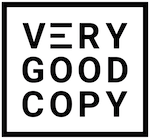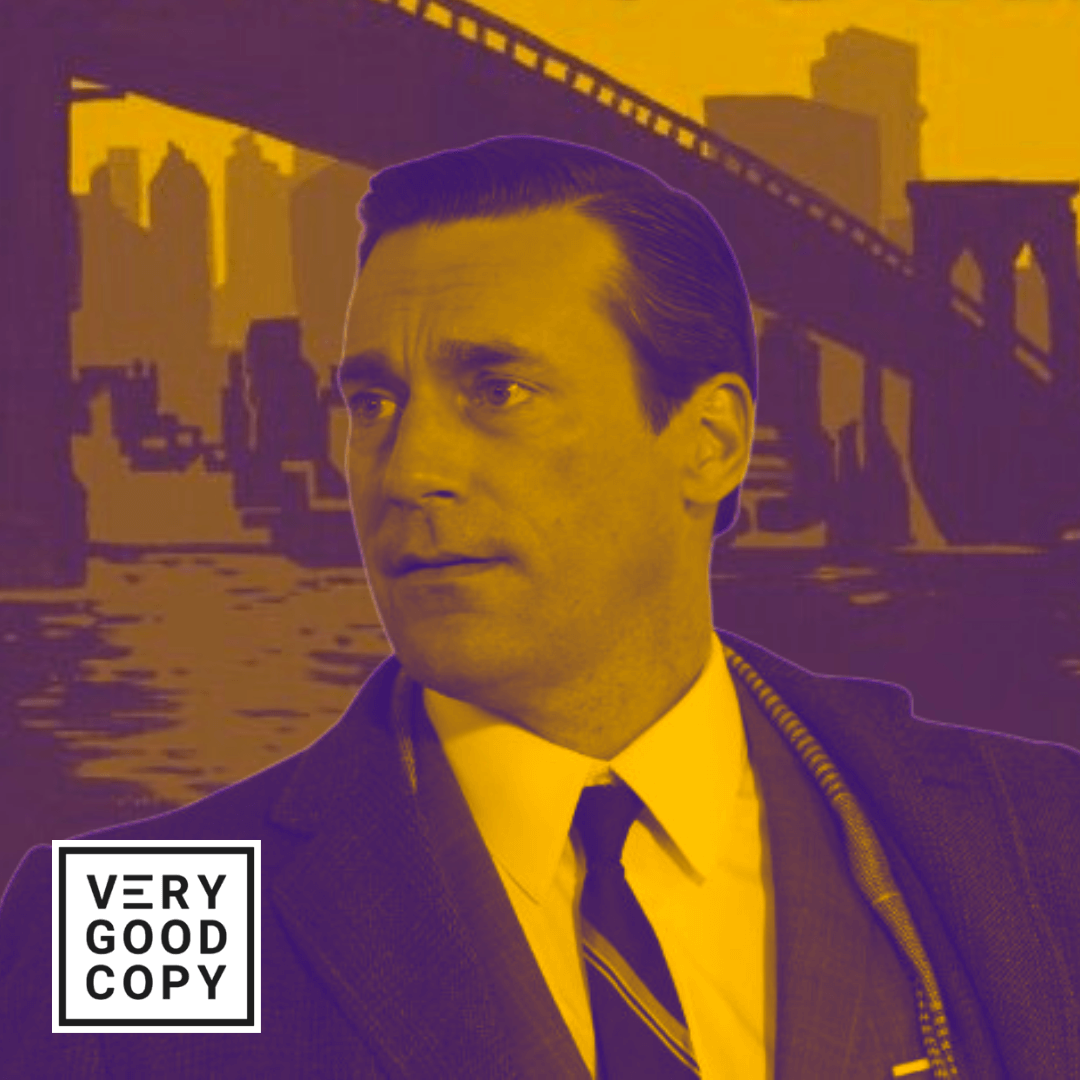
Mad Men ended years ago.
But I rewatch it often (nowadays to pass the time after Beau eats his bottle and falls asleep on me). Last week I watched an episode called New Amsterdam.
This scene stayed with me:
“So,” says Walter Veith, “what do you fellas have for me?”

Never miss a VeryGoodCopy Micro-Article: SUBSCRIBE
Walter’s the Vice President at Bethlehem Steel, a manufacturer.
“Well,” says Don Draper, “we take for granted the things we need the most: water, oil, electricity,” he takes a beat, “steel.”
Don’s the Creative Director at Sterling Cooper, an advertising agency.
Both men are in a boardroom in Midtown Manhattan. It’s 1960. Everyone’s wearing a suit. There’s a bar cart in the corner. Don is trying to win Bethlehem’s advertising business:
“I was thinking about the last time you were here,” Don says, turning towards the view, “looking out this window at this incredible city and saying: ‘It’s all steel.”
Don’s about to pitch a campaign idea:
He turns back towards the room, towards three canvases resting on easels:
“New York,” Don says, turning a canvas, “Brought To You By Bethlehem Steel.”
Walter shifts in his chair.
“City of Pittsburgh,” Don says, turning another canvas, “Brought To You By Bethlehem Steel.” He turns another: “City of Chicago, Detroit, St. Louis,” he says, “full-page ads in targeted markets: newspapers, trade publications.”
Walter shifts back. “They’re kind of plain, aren’t they?” he says. “Reminds me of those WPA ads before the war.”
“Walter, you’ve been doing this long enough,” Don says, “you know we can throw this artwork away in a minute. But the sentiment, the idea — it’s so basic, you feel like you already know it. You just haven’t thought of it lately.”
And therein lies a proven way to advertise, especially if you’re selling a commodity:
Use “preemptive claims” to create an association with your brand:
In other words, say something first and you own it.
For example, Marketing genius Claude Hopkins used preemptive claims over 100 years ago when advertising Schlitz beer. After visiting the factory and seeing the manufacturing process, he wrote ads with headlines such as “Every Bottle Sterilized” and “Bottled Purity.”
Was Schlitz the only beer maker to sterilize its bottles or filter its product? Of course not. Every beer company did these things. But Schlitz was the first to advertise it, which simultaneously created:
1/ a positive brand association in the public’s mind
2/ uncertainty about the competition’s product
Similarly, was every building in New York City built specifically with Bethlehem Steel? Of course not. But preemptively claiming this creates an association with — and preference for — a commodity brand that has no functional advantages over the competition.
“Cities are made of steel,” Walter says.
“Bethlehem Steel,” Don says.

LEARN TO PERSUADE
✅ Join thousands of email subscribers
✅ Less than 0.4% of readers unsubscribe
✅ Never miss a Micro-Article or -Interview
✅ Get instant email access to VGC's founder
✅ Be first in line to get new, free Micro-Courses
DRAYTON BIRD
Global Creative Director @ Ogilvy & Mather
BEN SETTLE
Email Marketing Master
KIM KRAUSE SCHWALM
A-List Direct Response Copywriter
RYAN BONNICI
Forbes 26th Most Influential CMO
SCOTT DIKKERS
Founding Editor @ The Onion 🧅
LISA PIERSON
Partner @ CopyHackers Agency
JUSTIN WELSH
SaaS Advisor & Writer
GODARD ABEL
CEO @ G2.com
DAVID GARFINKEL
A-List Direct Response Copywriter
JORGE SELVA
Director of Growth @ Help Scout
ADAM GOYETTE
Chief Marketing Officer @ Help Scout
TYLER J. KOENIG
Conversion Copywriter
TOMMY WALKER
Editor-in-Chief @ Shopify Plus & CXL
JASON VANA
Founder @ SHFT Marketing
JUSTIN BLACKMAN
Founder @ Pretty Fly Copy
CAMILLE TRENT
Managing Editor @ MarketerHire
NIKHIL NARAYANAN
Creative Director @ Ogilvy & Mather
EDEN BIDANI
Copywriter @ Greenlight Copy
MARK KILENS
VP of Content @ Drift































